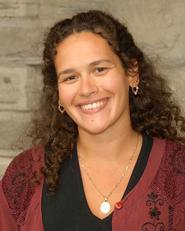
Assistant Professor of Comparative Literature Anjela Peck presented a paper at a conference held in conjunction with the Second International Seminar on the Inquisition and Ecclesiastical Justice in Springfield, Mo., on Feb. 7-10. Her paper, "The Cave as Prison, Womb and Portal to the Divine: Subverting Christian Inquisitorial Spaces in Early Modern Spanish Muslim Literary Texts," discussed Spanish Muslims' support of intense scrutiny and persecution of all Muslims.
The conference brought together scholars from Latin America, Europe and the U.S. to explore historical, literary, ethnographic, anthropologic and religious research on marginal histories using Inquisition sources. It was co-sponsored by the Ministry of Education of Spain, the Department of History at Missouri State University and the University of the Basque Country (Spain).
Through an analysis of "El rekontamiento de Tamim Addar" (The Legend of Tamim Addar), Peck suggests that the tale's anonymous Muslim author echoes his Christian neighbors' calls to expel the evil other from his midst. That is, he demonstrates that as a Spaniard himself, he saw inquisitorial campaigns working for and not against the individual and collective Muslim soul. Through the cave-like prisons depicted in the legend, Muslims and their societies are transformed into holier, purer and more spiritualized spaces to be in-dwelled by Allah's presence. In this way, Spanish Muslims depicted the agents of death, torture and bloodshed not as instruments of a Christian God, but of Allah, thereby subverting the power of the Inquisition over their minds, hearts and souls.
Posted February 12, 2008
